Caring for the city: street sweepers at work
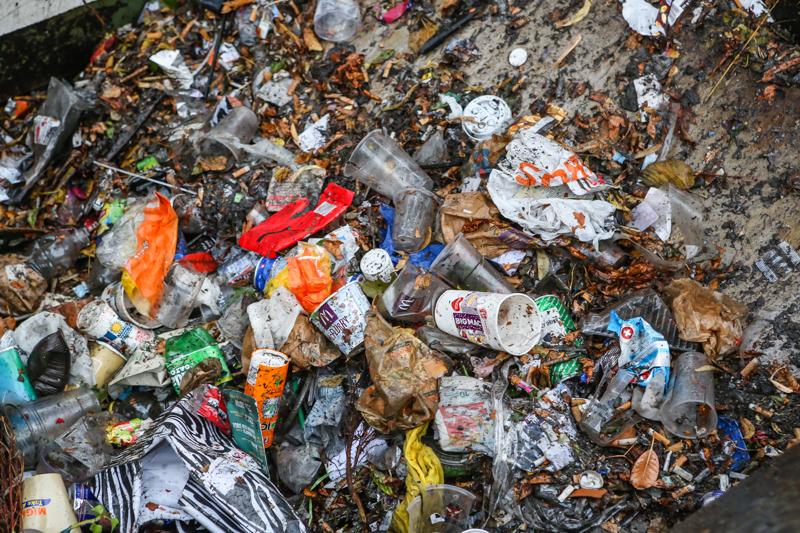
Switzerland's reputation as a tidy country with immaculate streets depends on the hard work of people who often go unnoticed – street cleaners. swissinfo.ch joined one as he toiled in the capital Bern while the city slept.
It is 3:50am on a Tuesday morning. The traffic lights are off and a police car is patrolling the city centre. The streets of Bern are otherwise deserted and the only person we see is a middle-aged man seated on a bench, fast asleep.
Roberto Citro, on the other hand, is wide awake. Dressed in the summer uniform of Bern municipal employees – orange trousers and a blue T-shirt – the 35-year-old is about to start his shift. This week he gets to drive the street-cleaning machine, the biggest one in the city’s fleet. “I’ve always liked driving,” he tells me.
A brush every 3-4 days
I meet him in the “bunker,” as he calls it, the headquarters of the Bern street cleaning department, on the first level of an underground parking facility. With an enthusiasm you wouldn’t expect at this hour of the morning, he shows me the collection of brushes and blowers, the vehicle area, the changing room, and the recreation room. His colleagues are mostly from other countries – Italians, Spaniards and Turks – he explains. He, himself, is Bernese of southern Italian origin.
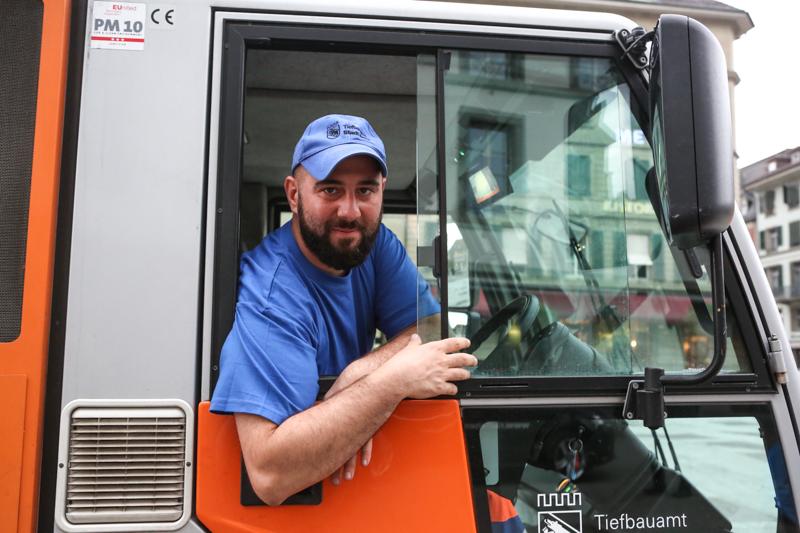
After checking the oil level and the rotating wheels of the machinery, we are ready to set off. Inside the driver’s cabin, the music from the radio is almost drowned out by the sound of the powerful motor of the vacuum cleaner.
We have been preceded by street sweepers using the traditional pick-up technique. “On average we use up a brush every three or four days,” one of them says. The staff on foot look after the pedestrian pavements and narrow spaces, with Citro taking care of the thoroughfares. Another group is responsible for emptying litter bins. Every night, there are about 15 municipal workers given the task of keeping the downtown clean. “It’s a nice feeling – I have the whole city to myself,” beams Citro, with his black beard and Neapolitan-accented Italian.
Sea of litter
With one hand on the steering wheel, the other on the control lever for the brushes, Citro moves slowly over the pedestrian area near the main railway station.
On the ground you see everything and anything – glass bottles, cans, plastic cups, packaging, paper and a lot of cigarette butts. Sometimes the machine’s rotors pick up purses and packets of drugs, Citro says. “I’m glad the drugs end up in the garbage.” In good weather, people spend more time outdoors, which means more work for the cleaners. “I can understand that they leave rubbish lying around. But I can’t stand the people who drop stuff on the ground when there is a litter basket right there,” he says.
In Bern, as in other cities and towns in Switzerland, littering usually carries a fine of CHF40 ($41). However, the quantity of refuse is constantly growing, notes Andreas Niklaus of the city engineering department in Bern. “The population is increasing year by year, and there are more and more take-away outlets,” he told swissinfo.ch.
This morning, the city of 140,000 looks pretty clean, Citro remarks. Nothing like at the weekends, when the downtown streets, especially near nightclubs, turn into a sea of litter. “It’s frustrating: you hardly finish your shift and the place is dirty again,” he exclaims ruefully.
Contact with people
While the city still sleeps, we get to one of the best-known thoroughfares in Switzerland: Parliament Square. This is the large open space before the federal palace – the seat of the Swiss government – and the building that houses the country’s central bank.
PLACEHOLDER
This is a well-patrolled area, so it is not surprising that there is not much litter about. Within a few minutes the orange machine has cleaned the whole granite surface. Citro does not want to stay too long, anyway. Traders are already setting up their stalls for the morning market and his presence might be a nuisance, he says.
Citro, who trained as a varnisher, has been working for the street cleaning department here since 2008. Over time he has got to know the rhythms of the city. The commercial streets have to be cleaned fast, since they soon fill up with trucks making deliveries to the shops, he says.
A lot to clean
The public space in Bern consists of 4.1 million square metres, equivalent to 850 football fields.
The 1,300 city litter boxes are emptied up to ten times a day.
In 2013 the street cleaning service picked up 3,113 tons of refuse.
Source: City of Bern Engineering Department
We leave the asphalt and granite and move on to cobblestoned streets. We are now in the old town of Bern, a UNESCO Heritage Site since 1983, visited by tourists from all over the world. For Citro, it makes no difference – he does the same job as in any other part of the city. Every so often, when it is his task to empty litter bins, he gets approached by tourists. “They think I’m a tourist guide and ask me things,” he says with a grin.
Contact with people is the part of his occupation he likes the most. Some passers-by criticise the noise, but sometimes they thank him too. “I have been given tips of five or ten francs.”
Litter, leaves and snow
We have been on the go for several hours now, and in the pale light of dawn the city gradually awakes. Trams and buses have started their runs, and we can see the first cyclists, elderly shoppers, and people walking dogs. For Citro, it means his level of concentration has to go up. “This is a task that takes attention and focus. It wouldn’t take much to cause an accident.”
Citro extends an invitation to anyone who thinks street-cleaning is a simple job that anyone could do: “Try going around with the brush for a few hours and then you can tell me about it.” Getting up very early for five or six days of the week can be very tiring. But every shift is different and the work is far from monotonous, he says.
In summer they pick up litter, in autumn it’s leaves – “that’s the toughest time of the year” – while in winter they have to shovel the snow off the pavements. “The best thing about it is that at the end you see the result of your work,” says Citro.
8,500 kg of rubbish a day
It is now 7:10am. The city centre tour is finished. In the back of the machine there isn’t much rubbish. “Better than nothing,” says Citro. On average, street sweepers in Bern pick up about 8.5 tonnes of rubbish a day.
For Citro and his workmates it’s time for a break. A coffee, a quick game of cards, and then he is off with his orange machine to clean another part of the city. And tomorrow, he will start the process all over again.
Fighting litter
Switzerland is one of the countries in Europe that produces the most urban waste. In 2013, the average amount of waste per head of population was 702 kg (481 kg in the European Union), according to Eurostat figures from March 2015.
Michael Hügi of the Federal Office for the Environment explains this situation in terms of high levels of consumption and the favourable economic climate in Switzerland. “Management of waste is not an environmental problem, as the rate of recycling in Switzerland (about 50%) is higher than the European average. But we need to keep down the amount of refuse to protect primary resources,” he told swissinfo.ch.
(Translated from Italian by Terence MacNamee)

In compliance with the JTI standards
More: SWI swissinfo.ch certified by the Journalism Trust Initiative

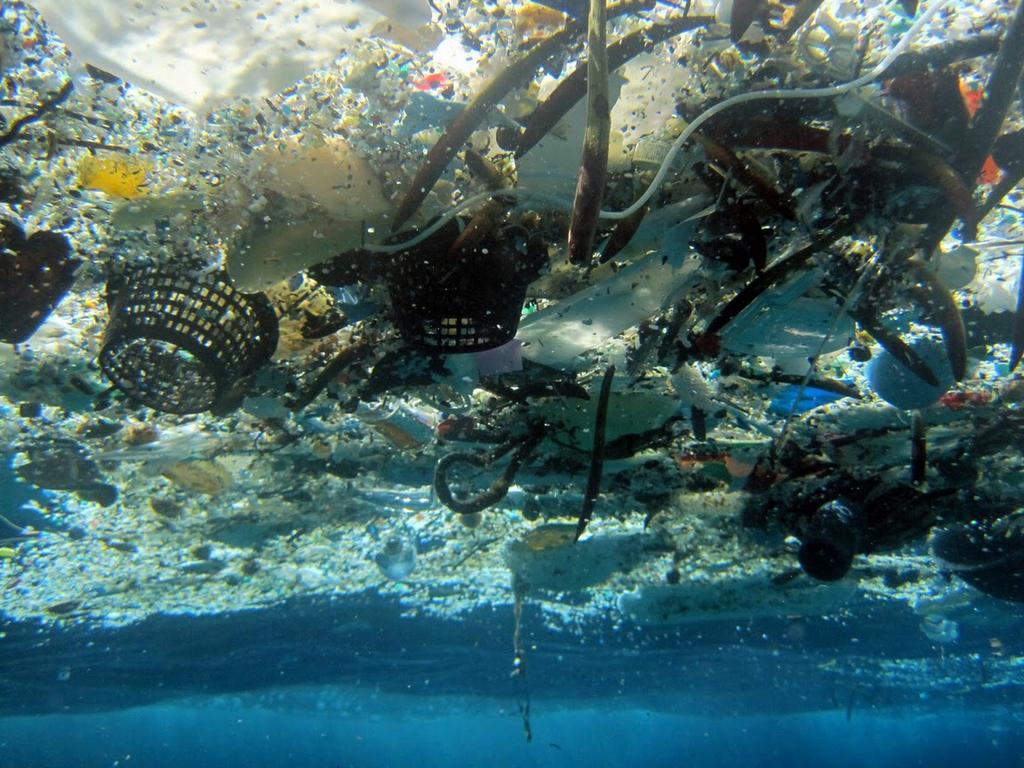
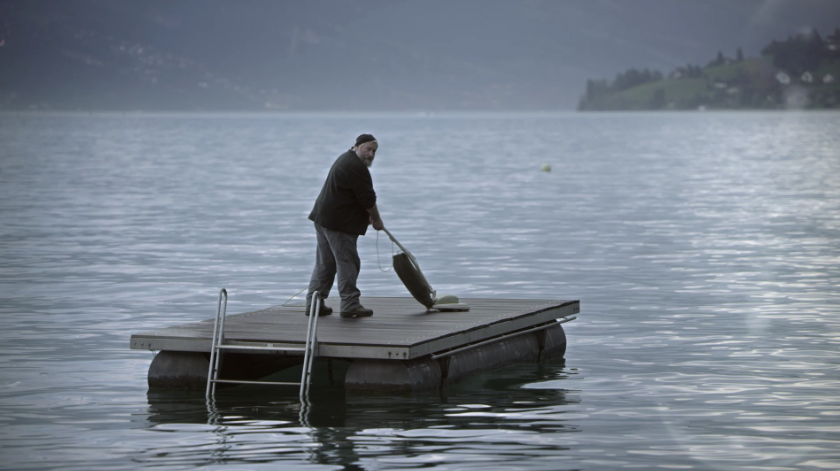
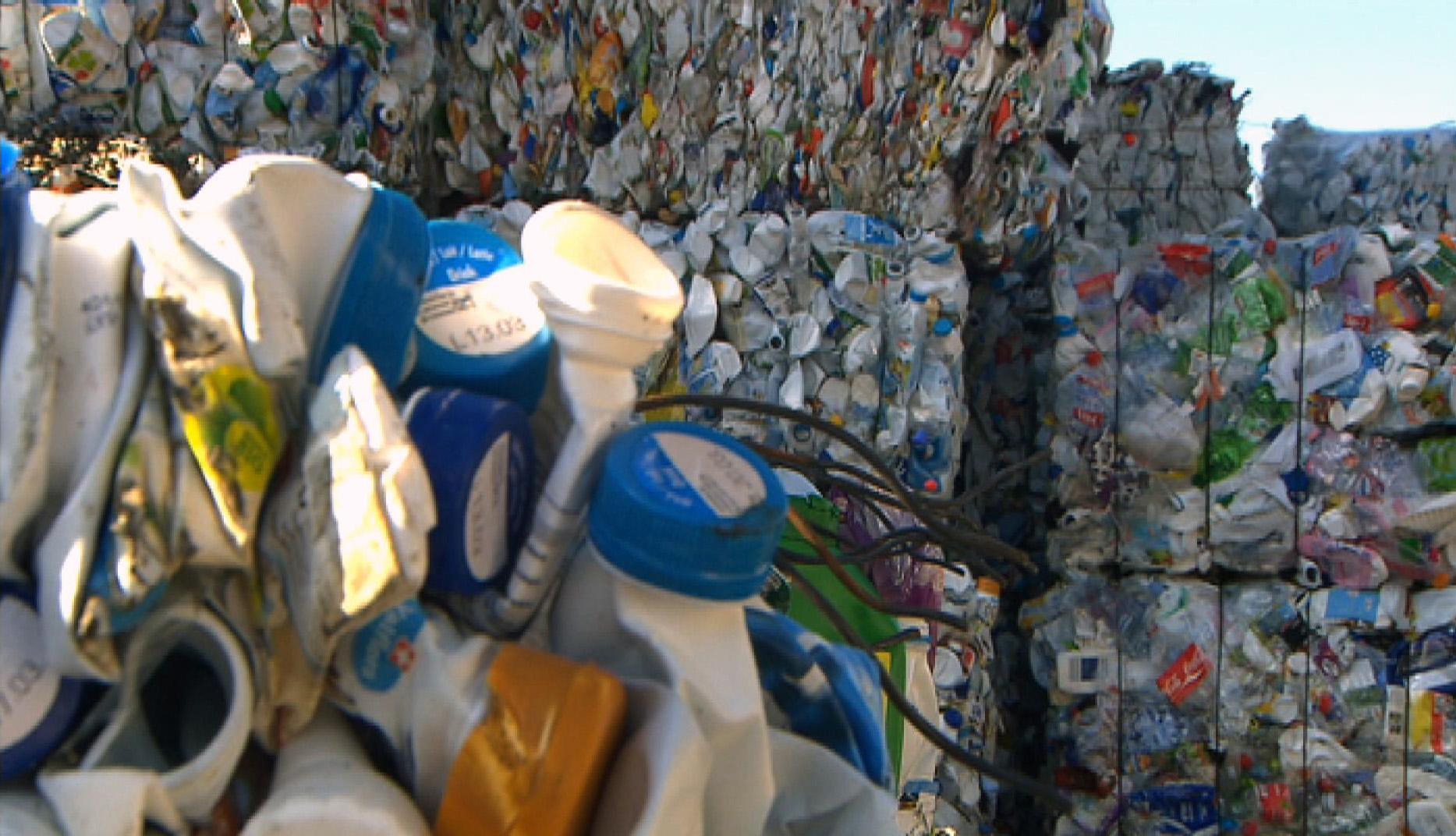
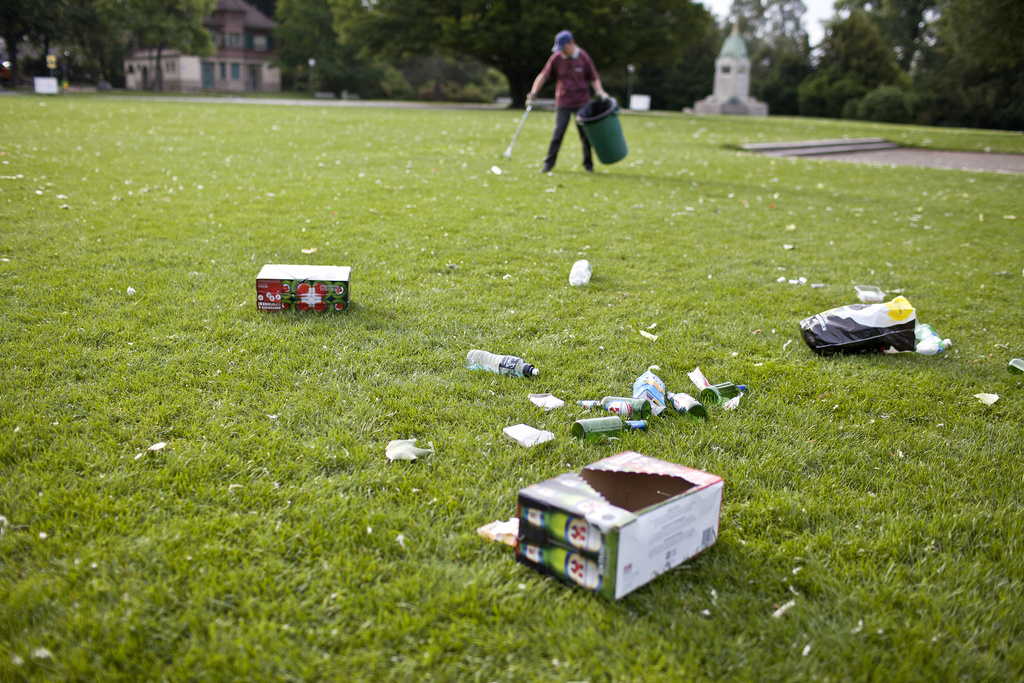
You can find an overview of ongoing debates with our journalists here . Please join us!
If you want to start a conversation about a topic raised in this article or want to report factual errors, email us at english@swissinfo.ch.